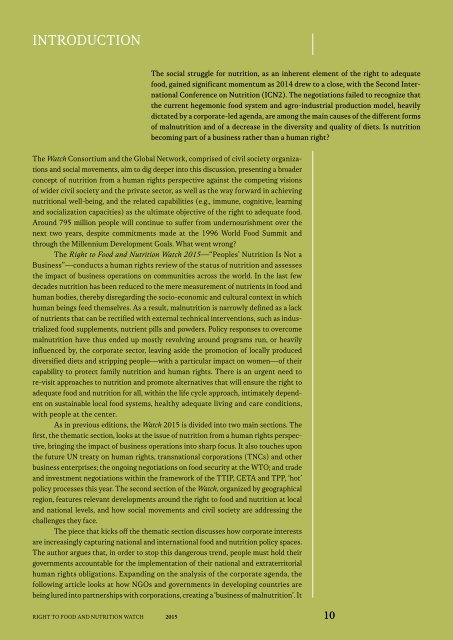RIGHT TO FOOD AND NUTRITION WATCH
1iNBHTY
1iNBHTY
Create successful ePaper yourself
Turn your PDF publications into a flip-book with our unique Google optimized e-Paper software.
INTRODUCTION<br />
The social struggle for nutrition, as an inherent element of the right to adequate<br />
food, gained significant momentum as 2014 drew to a close, with the Second International<br />
Conference on Nutrition (ICN2). The negotiations failed to recognize that<br />
the current hegemonic food system and agro-industrial production model, heavily<br />
dictated by a corporate-led agenda, are among the main causes of the different forms<br />
of malnutrition and of a decrease in the diversity and quality of diets. Is nutrition<br />
becoming part of a business rather than a human right?<br />
The Watch Consortium and the Global Network, comprised of civil society organizations<br />
and social movements, aim to dig deeper into this discussion, presenting a broader<br />
concept of nutrition from a human rights perspective against the competing visions<br />
of wider civil society and the private sector, as well as the way forward in achieving<br />
nutritional well-being, and the related capabilities (e.g., immune, cognitive, learning<br />
and socialization capacities) as the ultimate objective of the right to adequate food.<br />
Around 795 million people will continue to suffer from undernourishment over the<br />
next two years, despite commitments made at the 1996 World Food Summit and<br />
through the Millennium Development Goals. What went wrong?<br />
The Right to Food and Nutrition Watch 2015—“Peoples’ Nutrition Is Not a<br />
Business”—conducts a human rights review of the status of nutrition and assesses<br />
the impact of business operations on communities across the world. In the last few<br />
decades nutrition has been reduced to the mere measurement of nutrients in food and<br />
human bodies, thereby disregarding the socio-economic and cultural context in which<br />
human beings feed themselves. As a result, malnutrition is narrowly defined as a lack<br />
of nutrients that can be rectified with external technical interventions, such as industrialized<br />
food supplements, nutrient pills and powders. Policy responses to overcome<br />
malnutrition have thus ended up mostly revolving around programs run, or heavily<br />
influenced by, the corporate sector, leaving aside the promotion of locally produced<br />
diversified diets and stripping people—with a particular impact on women—of their<br />
capability to protect family nutrition and human rights. There is an urgent need to<br />
re-visit approaches to nutrition and promote alternatives that will ensure the right to<br />
adequate food and nutrition for all, within the life cycle approach, intimately dependent<br />
on sustainable local food systems, healthy adequate living and care conditions,<br />
with people at the center.<br />
As in previous editions, the Watch 2015 is divided into two main sections. The<br />
first, the thematic section, looks at the issue of nutrition from a human rights perspective,<br />
bringing the impact of business operations into sharp focus. It also touches upon<br />
the future UN treaty on human rights, transnational corporations (TNCs) and other<br />
business enterprises; the ongoing negotiations on food security at the W<strong>TO</strong>; and trade<br />
and investment negotiations within the framework of the TTIP, CETA and TPP, ‘hot’<br />
policy processes this year. The second section of the Watch, organized by geographical<br />
region, features relevant developments around the right to food and nutrition at local<br />
and national levels, and how social movements and civil society are addressing the<br />
challenges they face.<br />
The piece that kicks off the thematic section discusses how corporate interests<br />
are increasingly capturing national and international food and nutrition policy spaces.<br />
The author argues that, in order to stop this dangerous trend, people must hold their<br />
governments accountable for the implementation of their national and extraterritorial<br />
human rights obligations. Expanding on the analysis of the corporate agenda, the<br />
following article looks at how NGOs and governments in developing countries are<br />
being lured into partnerships with corporations, creating a ‘business of malnutrition’. It<br />
<strong>RIGHT</strong> <strong>TO</strong> <strong>FOOD</strong> <strong>AND</strong> <strong>NUTRITION</strong> <strong>WATCH</strong> 2015 10


